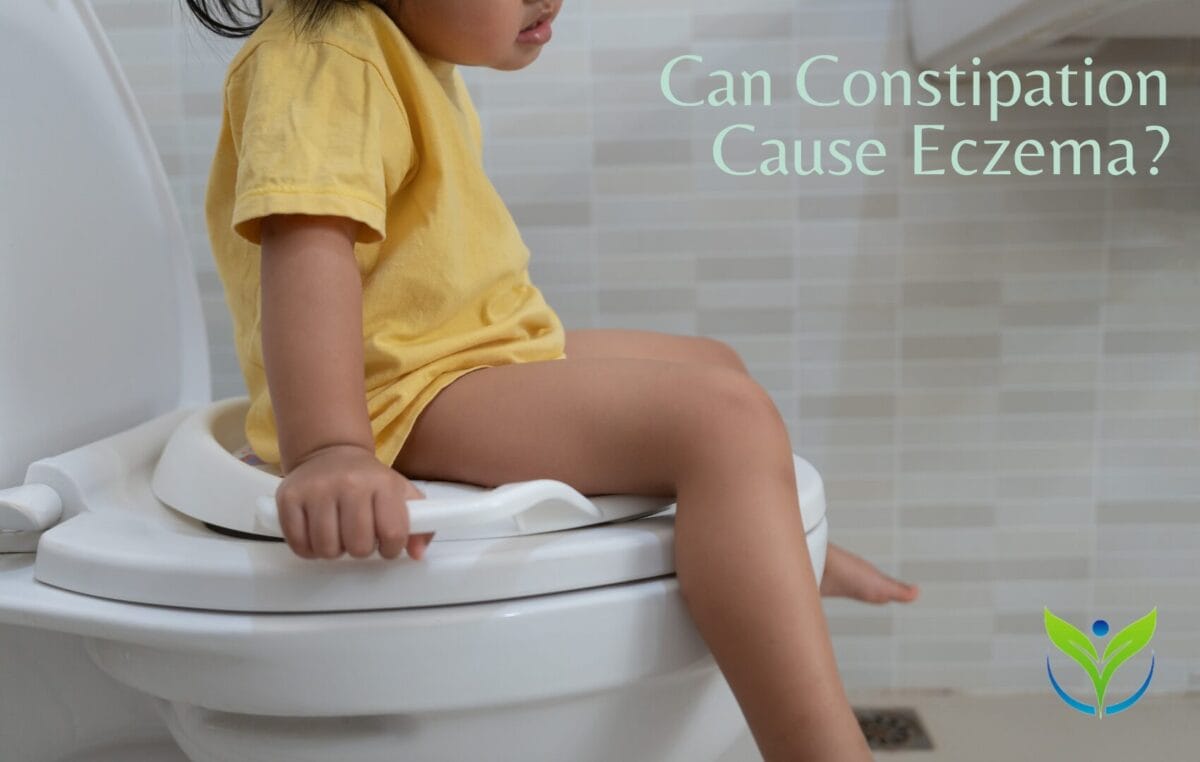Constipation and Eczema, let’s unravel the connection!
When my daughter Allie (now 19yrs old) was a baby, I nursed her for a year, but she only pooped once a week. I was told it was normal and I never thought anything about it. Incidentally, her brothers never experienced a day of constipation. Heck, some days I prayed for constipation to give me a diaper break! By the age of 3, Allie was covered in eczema, while her brothers sported amazing skin (their eczema issues would come later). As we began her eczema treatment with the standard steroid creams and wait approach, I was never asked about her bowel habits. Was her constipation an indication that something was amiss? Should I have paid more attention to this issue? Is there a connection between eczema and the gut?

“ALL DISEASE BEGINS IN THE GUT”
This quote is from Hippocrates nearly 2500 years ago. It applies to eczema as well. By this point you have read a lot about the gut-skin connection and that eczema is not simply a skin issue, but a whole body state of affairs. You may still be wondering about the truth of this statement.
Our bodies contain 10 bacteria cells for every 1 human cell (NIH). Basically we are only 10% human. In our adult gut alone, there are 3-4 pounds of bacteria residing there. These bacteria are in charge of digestion, immune system function, balance of hormones, regulation of neurotransmitters, and skin health. In a 2017 study, danish scientists took germ free and eczema free mice and placed poop bacteria in their colon from mice who were prone to eczema and compared them with a control group of germ/eczema free mice. After the eczema/germ free mice were inoculated with the gut microbiome (poop bacteria) of the eczema prone mice, the germ-free mice developed eczema just like the poop donors.
In humans, we cannot trade poop from one another and see what happens, so how does this information apply to our children? For most of us, gut health is a pretty good indicator of the status of our microbiome, generally speaking. For example, folks that are dealing with constipation, irritable bowel syndrome, diarrhea, and reflux are very likely dealing with an imbalance of bacteria in their gut, and this will likely put them at risk for developing conditions such as eczema. Does constipation cause eczema specifically? Depends how you interpret ‘cause’. The condition of the gut gives us a clue to the body’s overall working condition. To simplify, our body is a machine made of living parts. Like a a machine, if one part starts going amiss, it affect the other parts. Constipation or reflux are symptoms that point us in the direction of the defective part. The defective part, aka the gut, if not repaired, makes it more likely for a person to develop skin issues. In this next section I will summarize several studies that demonstrate the gut and skin connection. If reading studies makes your eyes glaze over, just look at the conclusions.
FOR A COMPREHENSIVE HOLISTIC ECZEMA TREATMENT PROGRAM CLICK HERE
THE GUT SKIN CONNECTION
Int J Clin Pract 2020 – Influence of constipation on atopic dermatitis: A nationwide population-based cohort study in Taiwan
- 85,554 constipated people and 85,554 people without constipation
- 1999 – 2013 from the Taiwanese National Health Insurance Research Database
-
the incidence of eczema was found to be 4.9 per 1000 person-years in the constipation group versus 2.1 per 1000 person-years in the non-constipation group
Conclusion: constipation was associated with a higher risk of developing eczema
BMJ Arch Dis Child 1998 – Gastrointestinal symptoms in atopic eczema
- 65 children with eczema and 65 children in the control group
- 1–14 years old
- 60% of children with eczema tested positive for a food allergens: egg, cows’ milk, casein, peanuts, lamb, pork, wheat, to name a few of the top ones
-
in 67% of children with both eczema and belly issues, the intestinal issues came first
Conclusion: a significant percent of kids with eczema suffered from diarrhea, reflux, and vomiting as compared to controls
Medicina (Kaunas, Lithuania) 2005 – Gastrointestinal disorders in children with atopic dermatitis
- 164 children (86 boys and 78 girls)
- 6 months to 18 years old
- 4/5 of the children suffered from a food allergy
- most common food allergens identified by skin patch testing: soy, milk, peanuts, corn, carrots, rye, wheat, white of the egg, cod, and chicken
-
63.4% of children were plagued by gastrointestinal disorders: abdominal pain vomiting, diarrhea, abdominal distention, and constipation
Conclusion: gastrointestinal disorders are very prevalent in children with atopic dermatitis
Aliment Pharmacol Ther – 2014 – The overlap of atopy and functional gastrointestinal disorders among 23,471 patients in primary care
- 30,000 primary care records reviewed over a minimum 5 year period.
- functional bowel disorders investigated: irritable bowel syndrome (IBS), functional dyspepsia (FD) and constipation
Conclusion: a strong correlation was found between people suffering from functional gut disorders and atopic conditions, including eczema
J Investig Med – 2018 – A 8-year population-based cohort study of irritable bowel syndrome in childhood with history of atopic dermatitis
- 120,014 children with eczema, 120,014 controls
- 2000-2007
Conclusion: Irritable Bowel Syndrome was found more often in children with eczema
SOLUTIONS FOR BOWEL ISSUES IN BABIES
LISTEN TO ME DISCUSS ECZEMA WITH THE WELLNESS MAMA
Pooping once a week in nursed babies is not normal. Babies and children should have a bowel movement every day. Please speak with your doctor or lactation specialist to make a customized plan for you. There is not one plan which fits all. Each human is different and each body responds to different approaches. Whether you are dealing with colic, reflux, or constipation, the following treatments can be effective. Here is a list of common solutions I discuss in my clinic:
- belly massage with bicycle movement – see video below
- castor oil compress on belly
- probiotics
- magnesium lotion or oral supplement
- epsom salt bath
- slippery elm root powder
- chiropractic care
- maternal diet modifications if nursing – no processed foods, keep sugar less then 24gms a day, eliminate dairy and/or gluten, lower acidic food intake like coffee
- once babies eat foods, make sure you feed them high fiber foods like avocado, beans, prunes, apples, pears. For more fabulous ideas visit SevenLayerCharlotte.com, where Lindsay Kingdon, my Eczema Course Health Coach, is putting together some great ideas for you. Fiber is great whether you are dealing with constipation, reflux, diarrhea, belly pain. Don’t forget that free water has to be increased because with little water and a lot of fiber, you can cause constipation.

SOLUTIONS FOR BOWEL ISSUES IN CHILDREN
The biggest issues in older children suffering from bowel issues are processed foods; white foods like bagels, pasta, bread, milk, cheese, crackers, sugar and lack of fruits, vegetables and water.
- PLANTS: Kids should eat fruits and veggies at every meal. The color of the rainbow with fruits/veggies provides essential minerals, vitamins, and fiber. Visit Lindsay’s Blog for ideas on how to get Picky Eaters to eat more plants and How to get kids to eat more fiber.
- WATER: Drink lots and lots of water daily. The goal is weight in pounds divided by 2 = # of ounces per day. For 50lb child, she should drink 25oz a day.
- FIBER: make sure everyone is getting enough fiber. Fiber is essential for a properly working gut. Here are some guidelines. Visit Lindsay’s post on how to get more fiber in your child’s diet.
- Children 1 to 3 years: 19 grams of fiber/day.
- Children 4 to 8 years: 25 grams of fiber/day.
- Boys 9 to 13 years: 31 grams of fiber/day.
- Girls 9 to 13 years: 26 grams of fiber/day.
- Boys 14 to 19 years: 38 grams of fiber/day.
-
Girls 14 to 19 years: 26 grams of fiber/day.
-
DAIRY: Decrease dairy in your diet and if that doesn’t work then eliminate it completely. Cheese is the most constipating food in the world according to my observations.
SUPPLEMENTS
If you need extra help with pooping as you change your diet, check out the constipation bundles in my store:
KID’S CONSTIPATION BUNDLE

PURCHASE NOW
Yours In Good health,
Drs. John and Ana-Maria Temple
Found this helpful? Save for later!





